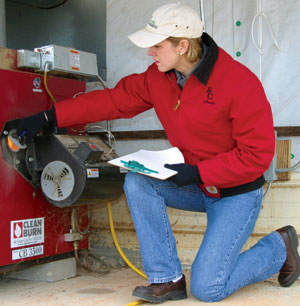Black Gold – Oil Fired Heaters Help Poultry Growers Save Money While Improving The Environment

There are two ways for a farmer to make a profit–produce more or spend less. When propane gas prices were 89 cents a gallon last year, Monica and Chris Carroll of Dale County discovered how to spend less for fuel to heat their poultry houses. It was a good decision and saved them a considerable amount of money. When propane prices topped $1.31 a gallon this year, their decision to invest in alternative fuel proved to be even better.Last year, the Carrolls installed oil-fired heaters on each of their four poultry houses at Precision Poultry, a division of 4C Land and Cattle Co. They decided to make the investment after reading a story in Neighbors magazine featuring DeKalb County farmer Mark Houston, who had converted his poultry operation to use recycled oil. Today, the Carrolls are buying used oil at a fraction of the price of propane.”Especially with the cold weather we’ve had this year, the investment has really paid off,” Monica said. “And the cost isn’t the only factor. For every gallon of oil we use to generate a Btu (British thermal unit) of heat, it takes one and a half gallons of propane to reach that same Btu level. Plus, we are converting a waste product to energy, and that helps the environment.”The Carrolls still use some propane as a backup when the chickens are small, but they’ve reduced the amount of propane they use from about 16,000 gallons to 3,200 gallons a year.Those results are typical of the savings observed in a year-long study conducted in 2004 by Alabama Cooperative Extension System Economist Gene Simpson, Extension Engineer Jim Donald and Extension Poultry Scientist Mike Eckman. The study tracked the fuel use and production in two identical poultry houses on a north Alabama farm. One of the houses was equipped with traditional propane heaters while the other was heated primarily with furnaces that burn reclaimed oil.Over the course of the year, the total fuel savings in the oil-heated house was $1,752, based on a conservative propane price of 90 cents a gallon and a used oil price of 50 cents a gallon. In addition, the researchers found the chickens in the oil-heated house performed better, resulting in an annual increase in production value of $1,469, based on a live-weight price of 5 cents per pound (See table on facing page).”On the production side, we observed–in flock after flock–an increase in the number of pounds of live weight sold. After six flocks, the total increase in production was more than 30,000 pounds,” Simpson said. The scientists attributed this weight gain to improved environmental conditions inside the poultry house. Smoke testing indicated extremely good airflow, and the relative humidity was 15-20 percent lower. Simpson also noted that the litter in the oil-heated house was drier and was virtually free of the wet clumps or “cakes” growers have to remove between flocks.Because the oil-fired heaters are located outside, Simpson said carbon dioxide and water vapor are not vented into the poultry house the way they are with conventional heaters. This improves the air quality inside the poultry houses, and the litter remains drier, so growers don’t have to clean out the houses as often.Simpson estimates the initial investment to outfit a poultry farm with oil-fired heaters is about $10,000 per house. That includes the price of the furnace and an 18-inch collapsible, nylon duct that carries the heated air the length of the house.The Carrolls originally figured it would take five years to pay for the oil-fired heaters, but with propane prices skyrocketing, they now expect to recoup their investment by the end of next year.According to Simpson, propane costs almost three times as much as used oil for the same amount of energy–based on an oil price of 50 cents per gallon. The Carrolls, however, have found a way to save even more.”We wanted to be certified by the Alabama Department of Environmental Management and the Environmental Protection Agency so we could handle and haul the recycled oil ourselves,” Monica said. “That process did include some paperwork, but it was worth it. Now we can actually haul the recycled oil ourselves, and in a lot of cases, we get it free or for as little as 12 cents per gallon.”The Carrolls collect oil every other week from a quick lube station, the local school bus shop and a tractor repair garage. But there are plenty of other sources for used oil. In fact, Simpson said Alabama generates enough waste oil each year to heat every poultry house in the state. Best of all, the price of used oil is relatively stable, unlike propane, which fluctuates wildly.Simpson is so sold on the technology that he predicts it will fundamentally change the way poultry houses are heated in the United States. “I’m at the point in my career–and I’m from Missouri–that you’ve got to ‘show me,'” Simpson said. “The first time I went (to see the oil-fired heaters) as a courtesy, and I kept an open mind. Now, I am convinced. I haven’t seen anything on the negative side.”The researchers have expanded their study this year to include more poultry houses. They also are exploring the possibility of using poultry litter and other types of biomass for fuel. For more information, visit www.poultryhouse.com.
